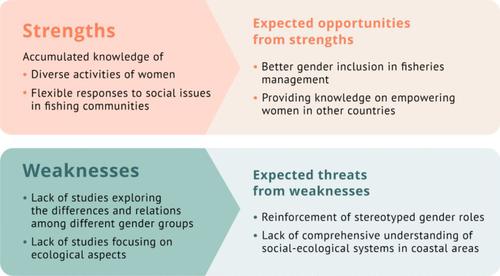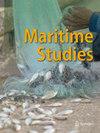日本沿海渔业的性别研究
IF 2.3
Q3 ENVIRONMENTAL STUDIES
引用次数: 0
摘要
摘要在世界范围内,渔业存在着不同的性别分工。必须考虑所有性别群体的活动和关系,以便充分了解为实现可持续性而利用沿海资源的社会生态系统。日本沿海渔业也存在性别分工。但是,着重于日本沿海渔业性别方面的研究数量有限。本文回顾了以往关于日本沿海渔业性别方面的研究,并通过与其他国家研究的比较,确定了日本研究的特点。结果表明,日本以前的研究大多是侧重于妇女活动的人类学或社会经济研究。根据研究结果,日本有必要开展三个具有性别视角的研究课题:(1)具有性别视角的沿海渔业社会生态系统研究;(2)渔业政策的性别差异影响研究;(3)沿海地区性别差异脆弱性和适应能力研究。这些研究的未来实施将避免对特定性别群体的负面影响,并通过探索尚未充分利用的基于性别的知识、网络和机会,为创新可持续和公平的沿海资源利用提供重要见解。图形抽象本文章由计算机程序翻译,如有差异,请以英文原文为准。

Gender research in Japanese coastal fisheries
Abstract Fisheries have diverse gendered division of labor worldwide. It is essential to consider the activities and relations of all gender groups to fully understand the social-ecological systems of coastal resource use toward achieving sustainability. Gendered division of labor is also found in Japanese coastal fisheries. However, the number of studies focusing on the gender aspects of Japanese coastal fisheries is limited. This paper reviews previous studies on gender aspects of Japanese coastal fisheries and identified the features of the studies of Japan through comparison with studies in other countries. The results indicate that most previous studies in Japan were anthropological or socio-economic studies focusing on the activities of women. Following the result, three research topics with a gender lens are considered necessary in Japan: (1) studies on social-ecological systems of coastal fisheries with a gender lens, (2) studies on gender-differentiated impacts of fishery policies, and (3) studies on the gender-differentiated vulnerability and adaptive capacity in coastal areas. The future implementation of these studies will avoid the negative impacts on specific gender groups and provide critical insights for innovating sustainable and equitable coastal resource use by exploring gender-based knowledge, networks, and opportunities that have not been fully utilized. Graphical Abstract
求助全文
通过发布文献求助,成功后即可免费获取论文全文。
去求助
来源期刊

Maritime Studies
ENVIRONMENTAL STUDIES-
CiteScore
4.90
自引率
11.80%
发文量
37
期刊介绍:
Maritime Studies is an international peer-reviewed journal on the social dimensions of coastal and marine issues throughout the world. The journal is a venue for theoretical and empirical research relevant to a wide range of academic social science disciplines, including anthropology, sociology, geography, history and political science. Space is especially given to develop academic concepts and debate. We invite original research papers, reviews and viewpoints and welcome proposals for special issues that make a distinctive contribution to contemporary discussion around maritime and coastal use, development and governance. The journal provides a rigorous but constructive review process and rapid publication, and is accessible to new researchers, including postgraduate students and early career academics.
 求助内容:
求助内容: 应助结果提醒方式:
应助结果提醒方式:


